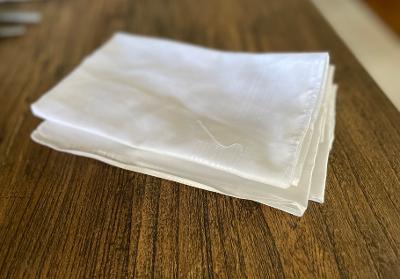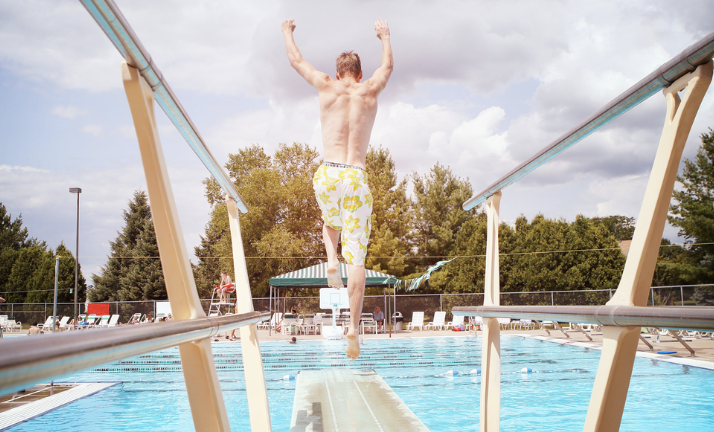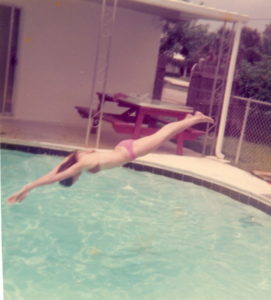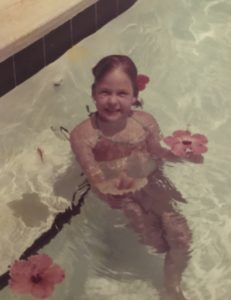
Handkerchief
My father had a sneeze that would wake the dead.
You could hear it from a quarter mile away on a clear day, and if you happened to be indoors in the same room–say, church or a crowded restaurant–people jumped, waiters startled, and small children clung to their mama’s necks at the sound. He used to joke that he tried to keep it in once, but it blew his eyeballs out, which was what enabled him to do his favorite dad illusion of popping an eye out, swishing it around in his mouth and popping it back in, a feat that equally fascinated and horrified his grandchildren. “Do it again!” they’d cry, trying to ferret out the trick.
He was liberal with the black pepper, which would reliably get him going with at least three or four deafening AAAA-chooo!!’s in a row. Alert family members could see it coming, like the slight tremors before a richter-scale quake. He’d pat his pockets, tilting in his seat for better reach, remove his glasses, and finally, with a flourish, whip out a handkerchief to try to contain the blast.
That handkerchief was one of the staples of my father’s wardrobe. He’d grown up in the 40’s and 50’s, when adults still wore hats to go into town and women dressed like Jackie O for an afternoon of bridge. Back then, it was common for young men to carry a handkerchief. Manners mattered, and sniffles, sneezes, or coughs were not meant to be shared with your neighbor. Also, if you happened to be a gentleman, it behooved you to have one on hand to offer a lady, should she cry in your presence (or, heaven forbid, because of it).
My father’s was a plain white cotton Fruit of the Loom variety, nothing fancy. I, of course, didn’t know him in the days before his fatherhood, so I can’t vouch for his use of it in wooing the fairer sex. As a father of five, however, uses for his handkerchief were endless. It became like Hogwarts’ Room of Requirement, materializing for whatever need arose, and there were many.
He used it for wiping toddlers’ tears and held it over our drippy noses, teaching us how to blow. He brandished it when we’d fall off a bike or out of a tree, a dampened corner dabbing at scrapes and scratches. It was handy for fishing: with fingers slippery from handling worms, a handkerchief in your grip helped remove a hook from the mouth of a crappie or bluegill. Once, when I stepped barefoot on a rusty nail protruding from a discarded board, the handkerchief staunched my blood en route to get a tetanus shot.
He worked his way through stacks of them. They started crisp and white, creased from the package, and by the time they were retired, they were marked with all manner of stains, likely riddled with holes, and sported more of a chalky gray hue. Stacked in a section of his sock drawer, they were arranged according to use: those decent enough for church, work, or more formal occasions, a used but not yet decrepit section, and then those on their way out, one oil change away from the trash bin.
I remember my father mowing the lawn on sweltering summer afternoons, pushing the old red mower in tidy rows back and forth across the St. Augustine grass. He’d pause every three or four passes and his right hand would whip a handkerchief out of his back pocket. He’d mop the sweat from his neck and face and soldier on. It would come out again when trimming the shrubs, leaning over a car engine, or painting a deck. Any outside activity was a surefire case for a handkerchief. If sawdust from a building project wasn’t generating that frightful sneeze, he could always use it to doctor the constant nicks and injuries from keeping a house and yard in tip-top shape.
If we ever found ourselves in want of a last-minute gift for a birthday or father’s day, the standby was a package of pressed handkerchiefs, monogrammed or plain, from the nearest men’s department. The shelves were always stocked full of them. I imagine they weren’t so much in demand as they once were in his day, times giving way to less practical things like silk pocket squares whose only use is to match a fancy necktie.
As I got older and moved out, I saw my father’s handkerchief less often, but in the days after my mother’s funeral, it was a constant presence. Home for that week, I’d look out behind the house to find my father walking out into the trees, a flash of white catching my eye as he hung his head and wiped his eyes, his grief a private thing with the woods his only audience. He’d straighten up and take a big breath before heading back towards the house, busy with people and casseroles, tucking his handkerchief back in its rightful place, no one, he thought, the wiser. What that simple piece of cloth must have witnessed, what depths of emotion it must have absorbed.
As the years passed, I’m certain he had more moments like those, hidden tears that come with the scourges of age: loss, worry, pain. The ultimate honor for a gentleman’s handkerchief, however, is not in service to self, but in offering aid to others. He used it to quickly catch a grandchild’s spit up and clean little fingers sticky from a popsicle. When collecting acorns or hickory nuts, it made a handy apron for a small child to carry treasures. It was ideal for wiping a damp golf cart seat to let a grandkid slide in beside him.
In the past couple of years, when I’d stop by his house to do my father’s laundry, I marveled at the number of handkerchiefs he still had. He’d been steadily giving away items for some time, downsizing to the essentials. His drawer still had unopened packages of new handkerchiefs. In his 80’s, he didn’t go through them as fast as he used to, fewer home projects, little grandkids all grown. Before his funeral, I raided my father’s handkerchief drawer. Each of his children and grandchildren, brothers, nieces, and nephews all held one during our last goodbyes. It seemed appropriate somehow, his last gentlemanly act of generosity for us all. Familiar with the fickle ways of grief, it felt to me he’d known how tears can arise at the oddest moments and had kept on hand the faithful squares to proffer.
I’ve kept that handkerchief nearby for the past seven months. I had it on hand a lot at first, like a security blanket, when bursting into tears at Costco, canceling a magazine subscription, or finding yet another piece of mail addressed to him in my mailbox. It definitely came in handy recently at my daughter’s graduation, my son’s wedding, and after receiving copies of my recently published book in the mail, all milestones I wish he’d been here to see.
This Father’s Day will be the first without my father, and I’m keeping his handkerchief in my pocket. You never know when a whiff of pepper might set you off, and I’m kind of partial to my eyeballs.



